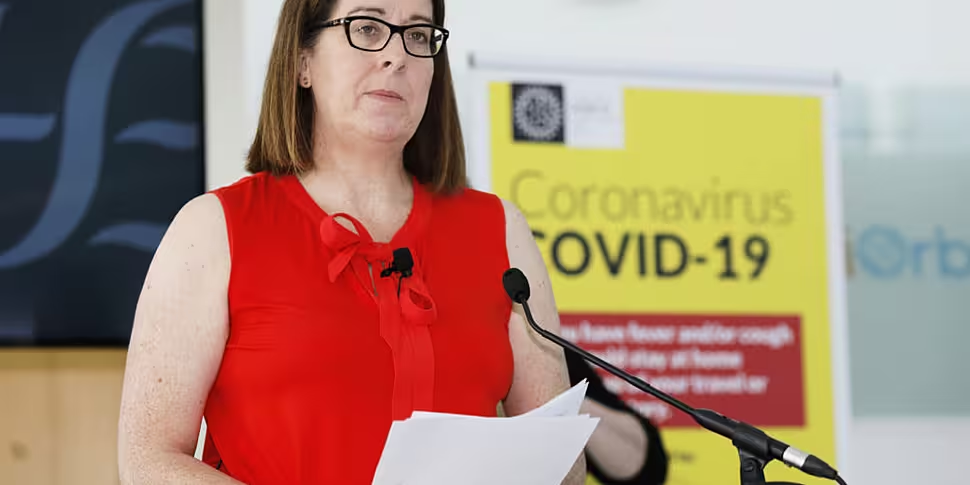The chief operations officer with the Health Service Executive (HSE) has said the health body will be cancelling procedures, in the event of a surge in coronavirus cases.
But Anne O'Connor told On The Record there is still time to change that trajectory.
"There's a number of challenges really - and it's important to say that the challenges won't just be in the hospital system, it'll be across our whole health system.
"People receive care outside of hospitals, and that's equally as busy if not busier at times now."
"We know that our attendances are close to where they were last year - and this time of year, regardless of any pandemic, we would be starting to prepare for what would be the busiest time of the year across our health system.
"We can see that now in terms of the activity that's going on - but I think from our perspective this year has become complicated obviously by COVID.
"We have an increasing number of people in our hospitals who are COVID positive - but also we have stated a lot of activity that we had paused during those critical months from March to June and July."
"Just to put a health warning on this: if it gets to the point where we have a very significant surge, that will happen, we will be cancelling things.
"I think that's why it's very important for people to understand that this is still something that we can change".
"What we don't want is to go back out to people and to cancel them again.
"But inevitably we have a fixed capacity in our health system - and even with the very welcome announcements around winter and the funding that we have for the rest of this year and next year, we still have to scale up, we still have to be able to look after people who are sick for all sorts of reasons.
"And also be able to respond to those who are COVID positive, and who have a very high-level of need in our critical care units".
She explained that any curtailment of services would be on a priority basis.
And ultimately this would be decided by on-site clinicians, rather than the HSE.
"That will always happen for us in terms of a busy period - we would do that in winter anyway.
"And for people who follow our winter activities around January, they'll know that we scale back on all elective procedures.
"In terms of the hierarchy, that's a clinical decision.
"And the clinical directors side by side will review who's due to come in.
"So for example: if we could see that the numbers in a particular site were becoming a problem in terms of congestion in our emergency departments, or not being able to respond to people with COVID, the clinicians on site would decide what activity should proceed.
"And usually we would proceed with the really critical surgeries.
"Where we would have a problem in relation to COVID this year is that to do those very serious surgeries, you need to have access to critical care beds.
"And if we have critical care beds full of people with COVID, it's very difficult then to bring in those very high-end surgeries.
"And that is where we worked throughout the last number of months with the private hospitals".
Deal with private hospitals
Asked if this model could be used again, she said some structures are already in place.
However the issue around capacity remains outstanding.
"There have been three different strands to the work that we're doing with them.
"One of the strands related to just a bridging arrangement in terms of hospitals being able to continue the work that they had started doing during those critical few months bringing us up the end of October.
"The next stage was for us to run a procurement process in terms of having a framework to be able to access procedures and also diagnostics - and that has now concluded.
"So we have that framework in place.
"And the private hospitals, or the local hospital groups, will be running mini-competitions - in procurement language - to be able to access services.
"So the private hospitals are now on a framework, those that wanted to be on it, and we will work with them in terms of the provision of services.
"The third strand is the one that continues to be under discussion: which relates to 'in the event of' a very significant surge and a need to be able to access capacity, how much of their capacity can we access.
"And I think we're all very keen that we would come to some agreement on that".
'People who need it most'
She also said people were nervous to come back into the health system after the last lockdown.
"What we saw the last time is that we tried, and we've continued I suppose, throughout the pandemic to try and provide care to people who need it the most.
"So people who have very serious illnesses relating to cancer, or different types of cardiac illnesses, and unfortunate many of our out-patient clinics were cancelled.
"Really what we had to do in those months was to cancel and reduce the number of people coming to our hospitals.
"We know a lot of people didn't come also by choice, we know from our emergency departments that the activity dropped to, I suppose, a worryingly low level.
"And equally we know that when we offered appointments to people, they didn't turn up - so people were very worried".









